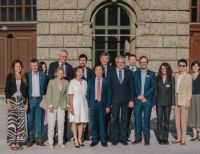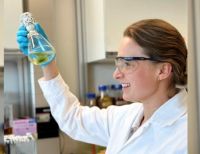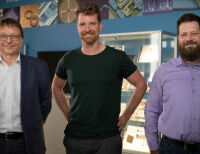People have always striven to stretch the bounds of possibility. Is what’s happening in research today really any different?
Panke: When we look at nature, we see how certain types of molecules appear again and again in virtually the same form, such as DNA. You could argue that just suggesting we try something different is already pushing back the boundaries.
So perhaps some scepticism is justified?
Bearth: Scepticism isn’t a bad thing per se. It’s actually good to instinctively take a precautionary approach. When we are unsure, we try to protect ourselves on an individual level. But it becomes problematic when decisions on a societal level are based purely on feelings and not on science.
Does public scepticism affect you, Mr Panke?
Panke: Absolutely! I couldn’t do things that would upset or alienate everyone around me. That’s not in my personality. Obviously we’re very open to new things at ETH. But that’s balanced by a raft of government regulations that give me the framework for my research. I can move within that framework without having to constantly worry that I might be about to do something wrong.
Ms Bearth, as well as being a researcher at ETH, you’re also Vice President of the Forum for Genetic Research at SCNAT. What’s your experience of the interaction between science, policymakers and the general public?
Bearth: For the most part, I find it very constructive. We’re witnessing a new generation that grew up with climate activism and sees plenty of opportunities in new technologies. CRISPR has a better image than traditional genetic research. In addition, the research community is becoming more aware of the issue and is investing more in science communication.
Panke: Those of us working in synthetic biology have certainly tried to engage in dialogue early on, but overall I have a very different impression of the current situation. It seems to me that society has lost a huge amount of trust in scientists since the 1980s. There’s a crisis of confidence, and our efforts to remedy this with better information aren’t working. People don’t believe us any more because we’ve messed things up too many times in the past.
Bearth: I don’t think that’s the case. Hardly any studies point to a steady decline in people’s trust in science. In reality, the level of trust is pretty much stable, and in some areas it’s even increasing. If there is the opposite impression, it might be because people who have lost trust in science are very vocal. Ultimately, they are a minority, but they are well organised. For example, the anti-vaccine movement is a powerful campaigning force. Their message can certainly undermine trust but mostly just makes people feel a little unsettled.
Panke: But what about genetic engineering in plant breeding? Researchers working in that field have tried so hard to get information out to the public, but my feeling is that none of their efforts have ever really got anywhere. Why is that?
Bearth: I agree that information is probably not the only solution. We can’t all become experts in everything, but people do need to have some basic understanding of the issues. We recently did a study on potato blight where we offered people various solutions. Interestingly, the approach people were most enthusiastic about was gene transfer, which is gene technology. And that was true whether or not we used the term gene technology. People tend to generalise about consumers being against genetic engineering, but I don’t think it’s as simple as that.
















